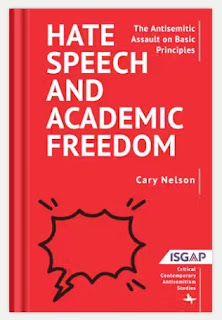The book was completed right before October 7, and while in some ways it has been overtaken by events, it is invaluable in its analysis of the intersection of academic freedom and limiting antisemitism on campus.
Cary Nelson is an expert on both. He was the president of the American Association of University Professors from 2006 to 2012 and he helped write policies on academic freedom in higher education. He is critical of decisions the AAUP has made since his tenure there.
When it comes to academic freedom, Nelson is as close to an absolutist as one can be. While he emphasizes that university can reject candidates for positions for any valid reason including antisemitic statements, once they are hired their application for tenure is pretty much the only time to review their records and decide whether they deserve to achieve that level.
His problem with antisemitism is not so much with the speech of professors who may spout bigoted opinions of Jews - but the effect that they have on the academic freedom of Jewish students who must navigate a university environment where their own expression of their Jewishness, which often is tightly tied to Israel, is severely limited.
Nelson points out, that when the National Women's Studies Association or various ethnic studies associations issue anti-Zionist statements, they effectively exclude any Zionists in that field of study. A department-level statement against Israel does not foster academic freedom but inhibits it.
The most egregious example he brings, to my mind, is the
statement of the University of California Press (apparently since taken down) that said
We want to recognize the powerful expansion of international solidarity with Palestinians in their fight for liberation and stand with them. We support scholarship that confronts all forms of settler colonialism, US racial formations including Islamophobia, and prioritize pedagogies that reflect intersectional, anti-colonial, anti-racist action. As a university press, it is our responsibility to disseminate scholarship that challenges dominant narratives and makes understanding these injustices possible.
This means that an academic press will be highly unlikely to ever publish any Zionist opinions, an astonishing statement of choosing a political side and silencing any opposing viewpoints under the aegis of the University of California.
Individual academics and students have great latitude in saying their opinions, but not departments with the imprimatur of the university itself on the letterhead of their statements. When entire fields have been co-opted by political positions like anti-Zionism, in Nelson's words, "the line between advancement of knowledge and promotion of political convictions...has been obliterated."
Nelson also tackles topics such as whether a prospective academic hire or tenure candidate's social media posts should be considered when making decisions about their positions in the academy. The AAUP says no, Nelson says that is absurd, certainly when the posts fall within the candidate's field of expertise. Social media has a much bigger reach and more influence than most academic papers do.
Other topics covered include professors instituting "micro-boycotts," penalizing students for their Zionist opinions, most infamously the case of John Cheyney-Lippold who refused to write a recommendation letter for a student who wanted to go to Tel Aviv University for a year, even after he told her he would (and ruined her chances for finding an alternate source for a letter.)
Nelson is a true academic. When he sees a claim he checks it out and does his own research, something that he notes does not happen as often as it should in academia. So, for example, he dedicates a chapter to the "Word Crimes" issue of the journal Israel Studies, where specific terms that have been hijacked by the anti-Israel crowd like "Apartheid" or "Colonialism" are examined as to what they really mean. The issue was mercilessly attacked yet most of the critics hadn't even read the journal. Nelson read it and critiques it, not agreeing with every article but proving that it has scholarly value and that many critics were not acting in good faith. I respect Nelson's desire to take every charge seriously (speaking as someone who spent too much time researching "
fart spray" when Israelis at Columbia were accused of a chemical weapons attack on campus.)
Nelson is a strong proponent of the IHRA Working Definition of Antisemitism, and examines that definition along with the "Jerusalem Declaration" as well as
a reference to my own, which I appreciate.
One other theme that carries over many of the book's chapters is that the accusations that Zionists are silencing opponents have no merit. Nelson looks at the specific examples and finds than none of them hold water - in practically every case, the supposed silencing never happened and the planned anti-Zionist event or speaker was not blocked by the institution. Too many anti-Israel academics cannot distinguish between criticism and censorship, perhaps because they know they often cannot answer real criticism coherently.
As with Nelson's earlier book
Israel Denial, he makes clear that he does not support settlements and has derision for Israel's right wing government. In this case, it makes his arguments stronger, since Nelson cannot be dismissed as a right-wing fanatic; he is a liberal in every sense.
It is a shame that the book is relatively expensive ($150 hardcover, $45 paperback and $34 Kindle from
Amazon)
Hate Speech and Academic Freedom deserves a larger audience than just the academics it appears to be aimed at.
|
 Buy the EoZ book, PROTOCOLS: Exposing Modern Antisemitism today at Amazon! Buy the EoZ book, PROTOCOLS: Exposing Modern Antisemitism today at Amazon!
Or order from your favorite bookseller, using ISBN 9798985708424.
Read all about it here!
|

|



 Elder of Ziyon
Elder of Ziyon























